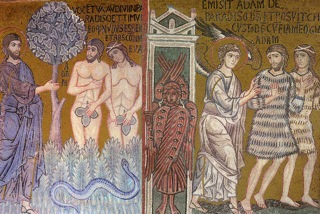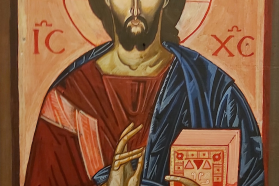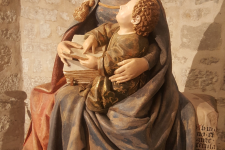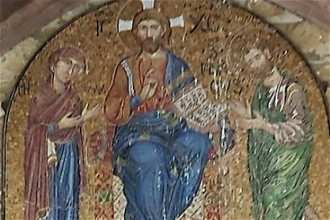Sunday Reflection with Fr Robin Gibbons - 23 February 2020

Expulsion from Paradise mosaic
Occasionally seemingly dense pieces of theological writing have the capacity to surprise me, 'taken unawares' is the phrase at the back of my mind! One such happened this week when I was trawling through an article on Karl Rahner and suddenly the phrase; 'we are both flesh and spirit' began to create a mantra in my mind. Rahner puts this concept in far more theological language, he suggests that underlying all our experiences is something more than chemical or bodily reaction to events-that"…is the one primal experience: that the human person is more then the sum of chemical elements and processes, that human life rests on an incomprehensible mystery, indeed constantly flows in that direction'.
( Vorgrimler; Understanding Karl Rahner. 14.)
What Rahner means, and it is a profound insight that unlocks so much of what we are about as Christians following Jesus, is that we are rooted in an experience of God, which is available to us, not in the future, but in everyday life, now,where the grace of God is made present to us, and where the perfection that is God, is shared with us. The situation for us is prayer, which for Rahner is a 'letting go', the surrender of our 'heart', (which is the context of our of our whole selves) into the encounter and mystery of God.
This is something available to all of us, and for me it is at the root of two particular passages in our Sunday readings. Firstly it answers that conundrum, the almost impossible,'So be perfect, just as your heavenly Father is perfect.'(Mt 5:48) For here I begin to see, with Rahner's help, that this perfection is not an absolute, but something developmental, we grow into it through prayer, our real human life, and through living Christian faith. All of these are encounters with God; we begin to see that command of Jesus 'to be perfect' as something ontological, a way of becoming one with God, which the ancient Eastern Christian Fathers and Mothers called 'Theosis', a process of union with the Divine One. The key to it is our belief in Christ, who in the incarnation takes on our life, so that we may by grace be transformed in Him. St Cyril of Alexandria calls it 'participation' in Christ or in St John of Damascus phrase 'partakers in divinity'.
The second passage from Paul places before us something really exciting, the reason for our human vocation, who we really are, and why we can and should make a difference to life, why we can and must turn purely human ideas on their head to seemingly achieve the impossible.
Here it is, like exploding dynamite in its revelation:
"Brothers and sisters:
Do you not know that you are the temple of God,
and that the Spirit of God dwells in you?" (I Cor 3: 16)
This is the reason why we can forgive others, change hate into love, turn the other cheek, and pray for those who persecute us, for we are already in the process of being made holy, and holiness is love, and perfect love casts out fear and forgives the sinner their sin! What a thought to begin Great Lent with, that we bear the Holy Spirit in our lives! May we all be set ablaze by the Holy Spirit!
Thoughts for the beginning of Lent:
From the Desert Fathers
Abba Joseph, a desert father, was approached by Abba Lot, who informed him that he had kept his rule of prayer, fasted, purified his thoughts, and lived peaceably-what more could he do? Abba Joseph held out his hands toward heaven, fingers extended, and said, "You can become fire." Each fingertip blazed like a candle. Abba Joseph's point was that the younger monk could be set ablaze by the Holy Spirit.
Karl Rahner
Encounters with silence
"Only in love can I find you, my God. In love the gates of my soul spring open, allowing me to breathe a new air of freedom and forget my own petty self. In love my whole being streams forth out of the rigid confines of narrowness and anxious self-assertion, which make me a prisoner of my own poverty emptiness. In love all the powers of my soul flow out toward you, wanting never more to return, but to lose themselves completely in you, since by your love you are the inmost centre of my heart, closer to me than I am to myself."
Forgiveness Sunday
In Eastern Christianity the Sunday before Lent is known as the Sunday of Forgiveness, for some Eastern Catholics who follow the Western Calendar, this is Feb 23rd, for the Orthodox it is March 1st. The Vesper service and meaning of this feast have strong resonances with our readings today, at the end of it, the Priest and each member of the Congregation ask forgiveness of each other.
One by one, each parishioner bows or prostrates, first before the priest, and then each other, asking, "Forgive me, a sinner."
Each responds with a bow or prostration, asking also for forgiveness and assuring, "God forgives." Each then exchanges the kiss of peace.
"Lent calls us to spiritual perfection, which is impossible without love and forgiveness. Thus before Lent begins, we are called to forgive all who have wronged us. Only then can we hope to attain perfection, which is the likeness of God."(Archimandrite Vassilos Papavasillour: Meditations for Great Lent)
On the Sunday of Forgiveness
Text below from Greek Orthodox Archdiocese of America website
'Before we enter the Lenten fast, we are reminded that there can be no true fast, no genuine repentance, no reconciliation with God, unless we are at the same time reconciled with one another. A fast without mutual love is the fast of demons. We do not travel the road of Lent as isolated individuals but as members of a family. Our asceticism and fasting should not separate us from others, but should link us to them with ever-stronger bonds.
The Sunday of Forgiveness also directs us to see that Great Lent is a journey of liberation from our enslavement to sin.
The Gospel lesson sets the conditions for this liberation. The first one is fasting-the refusal to accept the desires and urges of our fallen nature as normal, the effort to free ourselves from the dictatorship of the flesh and matter over the spirit. To be effective, however, our fast must not be hypocritical, a "showing off." We must "appear not unto others to fast but to our Father who is in secret" (vv. 16-18).
The second condition is forgiveness-"If you forgive others their trespasses, your Heavenly Father will also forgive you" (vv. 14-15). The triumph of sin, the main sign of its rule over the world, is division, opposition, separation, hatred. Therefore, the first break through this fortress of sin is forgiveness-the return to unity, solidarity, love. To forgive is to put between me and my "enemy" the radiant forgiveness of God Himself. To forgive is to reject the hopeless "dead-ends" of human relations and to refer them to Christ. Forgiveness is truly a "breakthrough" of the Kingdom into this sinful and fallen world.


















